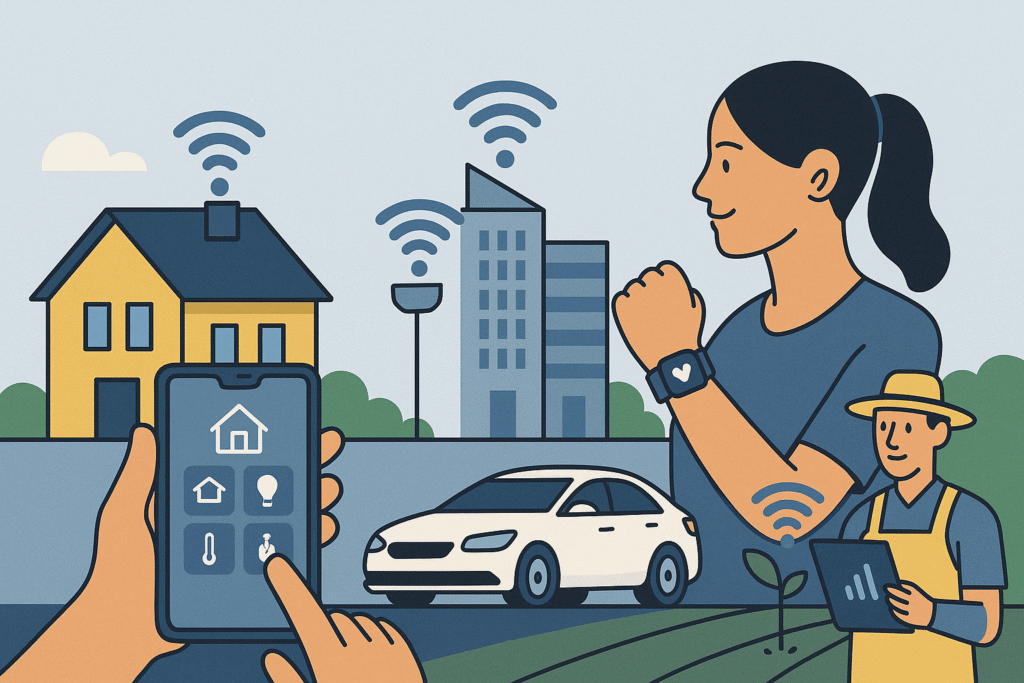Not too long ago, the idea of talking to our homes, wearing devices that monitor our health, or cars driving themselves felt like pure science fiction. But today, that fiction is our reality. Technology isn’t just in our hands anymore — it’s becoming part of our homes, cities, vehicles, workplaces, and even our daily routines.
Discover how smart technology is shaping our homes, cities, health, travel, education, and industries. From smart homes to AI-powered traffic in India, explore the future of “Smart Everything.”
Welcome to the age of “Smart Everything.”

Smart Homes: Living with a Digital Touch
Ever said, “Hey Alexa, turn off the lights,” or checked your door lock using your phone? That’s smart living.
In India, smart home adoption is rising fast. For instance, Tata Power EZ Home is helping homeowners across metros like Mumbai and Delhi automate lighting and appliances. Wipro Smart Devices are also being used in urban apartments to manage fans, switches, and even geysers from a mobile app.
The future? Homes that learn your habits and adjust lighting, temperature, and music to match your mood.
Smart Cities: Making Urban Life Smarter
Traffic jams, pollution, and water shortages are common urban issues — but smart cities are finding digital solutions.
Take Bhubaneswar, ranked one of India’s top smart cities. It has implemented a command and control center for real-time monitoring of traffic, waste collection, and emergency responses. Pune uses smart parking solutions and intelligent traffic systems to reduce road congestion.
These cities are using tech not just to fix problems but to plan for sustainable growth. Was
Smart Health: Your Body, Connected
Fitness bands and smartwatches from brands like Noise, boAt, and GOQii are popular in India — helping people track steps, sleep, and even oxygen levels.
During the pandemic, hospitals like Apollo and Fortis adopted remote health monitoring platforms, allowing doctors to track patients’ vitals from home.
Now, startups like Dozee are offering smart beds that track heart rate and breathing for hospital and home use — a perfect example of tech saving lives silently.
Smart Mobility: Travel that Thinks Ahead
Urban travel in India is getting a tech-driven facelift.
Hyderabad Traffic Police has adopted an AI-based traffic signal system that adapts to vehicle flow in real-time, reducing unnecessary waiting.
Ola and Uber already use predictive algorithms to shorten wait times and offer better routes.
Electric scooters from Ather Energy and Ola Electric come with smart dashboards, GPS tracking, and remote diagnostics — showing that even two-wheelers are getting smarter.
Smart Farming: Growing Food with Tech
Indian farmers are embracing technology to improve yields and reduce effort.
Startups like Fasal and KrishiHub are providing AI-based crop monitoring, weather predictions, and pest control tips in regional languages. In states like Punjab and Karnataka, drones are being used to spray fertilizers and monitor crop health.
Even the government-backed eNAM (National Agriculture Market) is helping farmers sell their produce more efficiently through a digital platform.
Smart Industries: The Fourth Industrial Revolution
Manufacturing and logistics in India are going digital too.
Tata Steel has implemented predictive maintenance in its factories using IoT and AI, reducing downtime.
Larsen & Toubro (L&T) uses digital twins to simulate and manage its infrastructure projects in real time.
Warehouses operated by Flipkart and Amazon India are now filled with smart conveyor belts and robots that sort, move, and package goods faster than ever.
Smart Learning: The Classroom is Evolving
Education went through a huge transformation during the pandemic, and now smart learning is the norm.
Platforms like Vedantu and WhiteHat Jr are bringing interactive learning into homes.
Government schools in Kerala and Tamil Nadu have adopted smart classrooms with digital boards and interactive content.
Some Indian edtech startups are even exploring VR-based learning to make science and geography more immersive.
Conclusion: A More Connected Tomorrow
Smart technology is slowly weaving itself into our daily lives. Sometimes it’s loud and exciting. Other times, it works quietly in the background — helping, learning, adapting.
And as India pushes forward in this digital age, the “Smart Everything” revolution is not just a luxury — it’s becoming a necessity.
It’s not just about convenience anymore — it’s about creating a better, safer, and more sustainable tomorrow.
